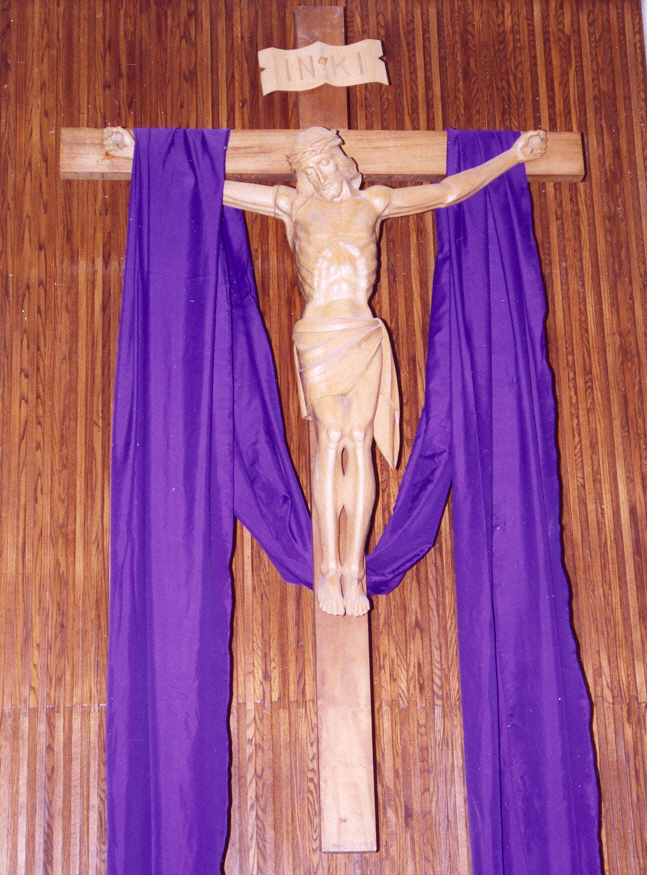
Return to
Index The Catholic Faith
Return to Level
Two Topic Index
Home Page
The path through life to Heaven is often compared to climbing a mountain, and the mountain-top is Heaven, God's holy mountain. In Psalm 43, the pilgrim on life's journey cries out to God: O send forth your light and your truth; let these be my guide! Let them bring me to your holy mountain, to the place where you dwell.
Christ our Savior offers us a way that will lead to peace, joy, and our final goal of total happiness with God. The way that leads to this wonderful state of perfection, or holiness, is based on Jesus' words: "Whoever wishes to be my follower must deny his very self, take up his cross each day, and follow in my steps" (Lk 9:23).
Self-denial may mean doing something we would rather not do or refusing some pleasure we would like: for example, taking time to help another member of our family in some work. An example on a deeper level is to give your own particular task the best possible effort, although it may not be easy and you may have to spend much time to do it. The effort you spend may take on the nature of a cross, especially if it is difficult.
Now we have come to a great mystery - the doctrine of the Cross. It is the principal sign of Christianity. As a result of original sin, it is necessary for us to put to death in ourselves a certain way of living which St. Paul calls "the old man" and to put on "the new man", Jesus.
The old man is Adam, who misused the gifts of God and so brought sin and disorder into the world. As you know, this sin is passed on to us as Adam's children. We are born in the state of original sin. Through Baptism we are given the life of grace, but original sin has left in us many wounds and disorders. These wounds can only be healed by a lifetime of right living, prayer, and self-denial.
This is not always easy. When Jesus asks us to love our enemy and to do good to those who hurt us, he is not asking us to do something that comes naturally or easily. But, by the power of God, it is not impossible. For with God "all things are possible" (Mt 19:26).
The Cross sums up all the things which, naturally speaking, are most distasteful to us, such as a penance we choose for ourselves or a suffering that God allows in our life - perhaps an enemy at work or some sickness - permitted for our good or the good of others, though we may not be able to see it at the time.
Bearing the crosses (that is, trials and difficulties) which we do not choose but which come to us anyhow in the course of life is a most perfect kind of self-denial, more pleasing to God that the acts of self-denial we choose for ourselves. For in all things it is most perfect to accept the will of God, especially when we do not like it very much. Jesus' entire life was one of obedience to the will of the the Father, no matter how hard it was or what it required of him, even his death. "Father, if it is your will, take this cup from me; yet not my will be yours be done" (Lk 22:42).
And why are we wiling to set out on such a way of life? In following the example of Jesus we are showing our love for God by willingly and, yes, even cheerfully accepting whatever he permits.
Fast and Abstinence

We are encouraged to choose some penance for ourselves. To help us, the Church requires us to fast and to abstain from certain foods on penitential days. To abstain, in this case, means not to eat meat. Those who are fourteen years old or more must abstain from meat on Ash Wednesday and Good Friday. In the United States, the bishops have further declared abstinence from meat on all Fridays of Lent. In other seasons, Friday remains a day of penance on which we are supposed to practice some kind of self-denial, and the bishops advise us to make Friday a day of abstinence all year round.
Fasting, in general, means not eating at all. When the Church requires us to fast, however, it means that only one full meal a day should be eaten. but those taken together should not equal another full meal. In the Church, there are two days of required fasting: Ash Wednesday and Good Friday. This applies to anyone eighteen to sixty years old.
Penitential Seasons

Advent and Lent are special seasons in the Church year in which we are reminded to renew our spirit. They are called penitential season. Advent begins four Sundays before Christmas and is a season of special preparation for the birth of Christ. The Church suggests that we do some form of penance as part of this preparation.
The season of Lent begins six and a half weeks before Easter and is a season of preparation for the Passion, death, and Resurrection of the Lord. Just as Jesus fasted for forty days, we too take on some penance during lent to make up for our sins and to prepare our hearts to celebrate the great Easter feast.
St. Paul compares the spiritual life to a race and the Christian to an athlete. Like an athlete, the Christian is asked to practice certain spiritual exercises. If an athlete will give up a great deal just to train for a race, how much more should we Christians be ready to practice self-denial for the sake of the Kingdom of God!
Besides, what the athlete gives up in training is not always so great, and his self-discipline is often very satisfying, invigorating, and enjoyable. His muscle tone, increased skill, and sense of well-being make it all worthwhile.
It is the same way with the Kingdom of God. The Cross does not always stand for something great and awful. It can include many little things which make up our daily lives, such as not having things go our way, forgiving an unkind word, turning from fun to duties at the proper time, not overeating and the like. Nor are we expected to make life one big penance with no pleasures. After all, it is God who created the things in which we find pleasure. But, like a good athlete, we must keep an eye on the coach - Jesus - and not forget ourselves and break training.
Penance, therefore, makes up for past sin and helps prevent future sin. It helps eliminate those things that take us away from God or are obstacles to our final goal - union with God in his Kingdom.
Used with the permission of The Ignatius Press 800-799-5534
Return to
Index The Catholic Faith
Return to Level
Two Topic Index
Top
Home Page